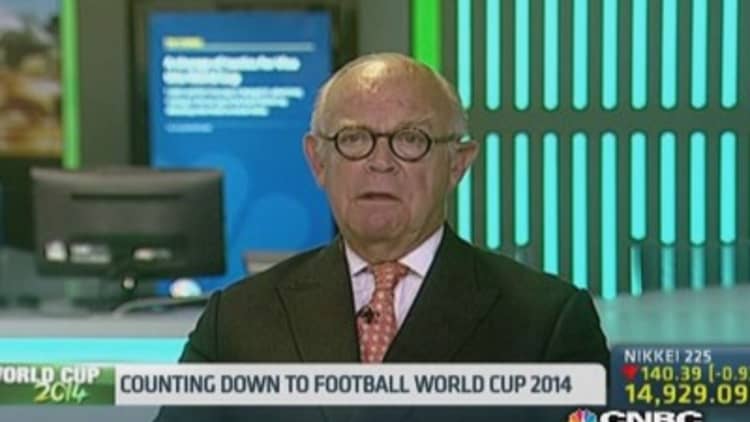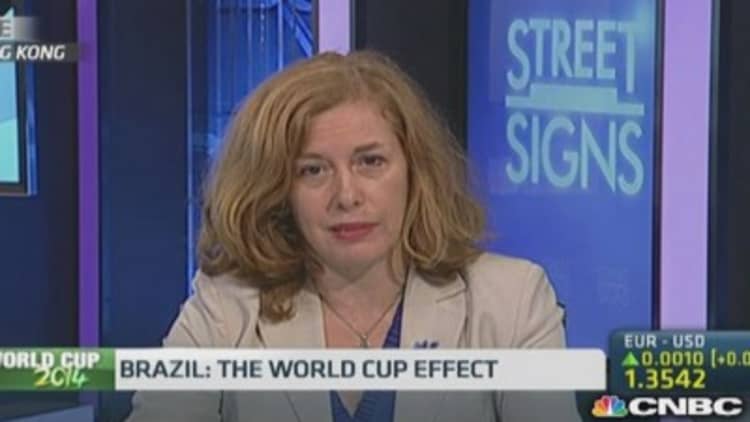As the World Cup kicks off in Brazil, sports industry experts are concerned the multibillion-dollar soccer industry is in a financial bubble.
While the top English teams like Manchester United, Liverpool and Chelsea have benefited from foreign investment and broadcasting revenues over the past decade, few have managed to turn a healthy profit, weighed down by ever-escalating player wage and transfer costs.
"U.K. football has been going through its own form of QE (quantitative easing) since foreign investors started to come in," said H2O Markets' Michael Jarman, an ex-professional soccer player turned financial market strategist.
"Although the money is there in the sport right now—thankfully, the English league is well-backed by broadcasting and licensing money—there is only so far those deals can go; there is only a certain amount of money within the system."
Read MorePremier League set to score with £3.2B sales this season
Indeed, five Premier League clubs made pre-tax losses in excess of £50 million ($84.1 million) during the season, including Chelsea and Manchester City. Liverpool posted the worst loss, of £70 million.
At the same time, wages rose 8 percent to a total of £1.8 billion, with the average player commanding £1.6 million ($2.7 million) a year, according to Deloitte. It forecasts that total wage spend reached a new record of £2.2 billion in the 2013/14 season.
"Keeping costs under control, particularly with regard to player wage costs, remains pivotal in order ensure that football clubs are sustainable," said Deloitte in its review.
Read MoreSoccer tops baseball to be world's best-paid sport
One side-effect of this is that clubs are heavily indebted. The aggregate net debt of Premier League clubs increased 6 percent to £2.5 billion in 2013, with Chelsea, Newcastle United, Queens Park Rangers and Aston Villa accounting for the bulk.
Jarman likened the situation to the mass provision of cheap, low-quality mortgages in the U.S. pre-2008, which caused its housing market to spiral out of control before collapsing, in a massive blow to the global economy.
"It is madness," Jarman told CNBC. "It just screams to me sub-prime mortgage crisis."
Could the bubble burst?
Jarman warned that efforts by the likes of Russia and China to kickstart their own leagues, coupled with European clubs' ongoing financial difficulties, could see investors take their money elsewhere.
"They are starting to go worldwide now," he said. "Football clubs have to start moving into the black."
Read MoreWorld Cup fever in Asia: Sick notes and no sleep
However, Deloitte said that investors often viewed top-flight football as a means to raise their own profiles, rather than turn a profit.
"Despite the general lack of profitability, investors continue to be attracted to top European football clubs. The prestigious status of owning a football club can provide a useful media and business profile, access to important corporate, personal and political relationships, and excitement and emotional returns if on-pitch results go well," wrote Director Paul Rawnsley in the review.

Decade-long spiral
Tom Cannon, a professor in the University of Liverpool Management School's football industries group, said English soccer had been in a financial bubble for at least the past decade.
There were two further factors that could see the bubble burst, Cannon said, one being resurgence in the violence and hooliganism which beset U.K. football in the 1970s and 1980s.
"That would scare off an awful lot of investors… It would certainly put off Americans," he said.
The other potential pinprick is a falloff in the battle for television rights to screen Premier League matches. Last season's fight between BT Sport and BskyB for the rights is forecast to have pushed Premier League broadcasting revenue to £5.6 billion, amounting to over-half of total sales.

Fears of bubble overblown?
Some analysts see the escalation in player wages softening, despite the upward trend.
"I actually think wages on the whole are not going up at a rate which is prejudicial to the game. I think there are a small number of the very highest earning players whose wages do appear to be very extreme, that distort the numbers," Graham Shear, a partner specializing in sports law at Berwin Leighton Paisner, told CNBC.
Adam Bull, senior consultant in Deloitte's sports business group, told CNBC that despite last season's wage rises, the large expected uptick in sales meant wage-to-revenue ratios declined.
"Clubs typically spent more money on players in advance of big broadcast deals, like those that came into force this season," he said.
"Given the forecast increase in revenue, this would also return the wages-to-revenue ratio below 70 percent for the first time since 2009/10."

